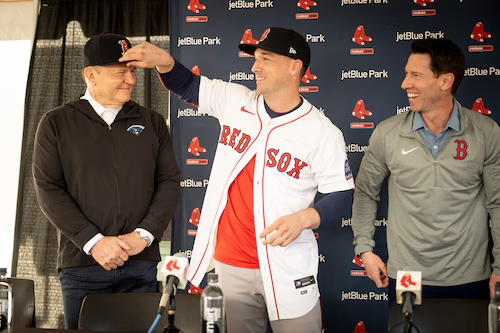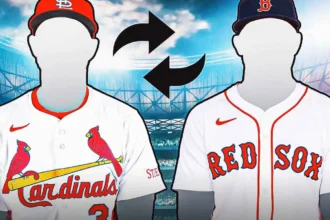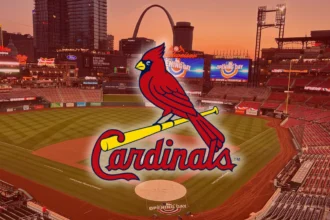All-Star third baseman Alex Bregman has once again entered free agency after choosing to opt out of his three-year, $120 million contract with the Boston Red Sox on November 4. The decision came almost exactly nine months after Bregman had put an end to one of the most dramatic free-agent sagas of the previous offseason by signing that very same deal. At the time, the former Houston Astros star had been seeking a longer, more secure contract that would carry him through the later stages of his career. However, his market was surprisingly limited — only two clubs, Boston and the Detroit Tigers, made serious efforts to land him.
Now, Bregman finds himself back in familiar territory: free agency. But this time, the context is different. He will turn 32 years old before the 2026 season begins, and his recent health and performance questions may affect how aggressively teams pursue him. The third baseman missed 43 games this past year due to a nagging quadriceps injury, the same muscle group that forced him to sit out 59 games in 2021 during his time in Houston. The injury clearly impacted his rhythm at the plate, raising questions about his long-term durability and whether he can maintain the elite form that once made him one of the American League’s premier players.

Before going down with the quad injury, Bregman had been off to one of his best starts in years. In 234 plate appearances, he recorded an impressive .927 OPS with 11 home runs, proving he could still be a dangerous middle-of-the-order presence. However, following his return, that production fell dramatically. In 261 plate appearances, his OPS dropped to .727, and he managed only seven home runs. As the Red Sox made their playoff push late in the season, Bregman’s bat went quiet a disappointing development for both player and team, given the expectations that surrounded his arrival in Boston.
Bregman’s decision to test free agency again is a gamble one that could either land him another lucrative payday or expose a cooler market than he expects. His agent, Scott Boras, is known for his aggressive negotiating tactics and for creating bidding wars around his clients. Yet, his comments this week suggested a degree of caution about how much demand there will actually be for his client this winter.

Speaking at the MLB General Managers’ Meetings in Las Vegas, Boras delivered one of his trademark pun-filled statements that both amused and intrigued baseball fans. Referring to the idea of Bregman leaving Boston, Boras quipped, “No one wants a Breg-xit.” In his signature style, he extended the metaphor, likening Bregman’s impact on the Red Sox to a fine cup of coffee that the team and its fans had come to appreciate.
“I think it was a bad roast in Beantown and, certainly, give the owners credit in ’25,” Boras said in a tongue-in-cheek analogy, captured in a video posted by WBZ-FM’s Tyler Milliken on X. “They went out and spent some Starbucks to bring in a Bregman blend that led them to the playoffs. So I’m sure the Boston fans don’t want this to be just a cup of coffee. And no one wants a Breg-xit.”
The “Breg-xit” wordplay was a nod to Brexit, the 2016 British referendum that saw the United Kingdom vote to leave the European Union. Boras’s pun was both a clever soundbite and a message to Boston’s front office: the Red Sox shouldn’t let Bregman walk away after just one season.

The irony, of course, is that Bregman already did engineer a “Breg-xit” by opting out of his deal. His decision effectively reopened the door to negotiations not only with Boston but with other interested teams as well. The question now is whether he’ll “reverse course” and return to Fenway Park on a restructured contract, or if he’ll seek a new opportunity elsewhere.
Early indicators suggest that the Red Sox remain the frontrunners to bring Bregman back. In a recent MLB.com survey of 46 baseball writers, a plurality of those polled 43 percent or 20 writers predicted that Bregman would re-sign with Boston. The next most popular pick was the Detroit Tigers, who received 17 votes (37 percent), followed by the Chicago Cubs, who garnered three votes (7 percent).

The results show a divided market but one that still views Boston as the most logical destination. The Red Sox, after all, were the team that took a chance on Bregman last winter when other clubs were wary of his age and injury history. They invested heavily in him, betting that his postseason experience and leadership would help anchor a young core that included Ceddanne Rafaela, Triston Casas, and Roman Anthony.
That bet paid off at least to an extent. Boston snapped its playoff drought, returning to October baseball for the first time since 2021. Even with Bregman’s late-season struggles, his early-season production and clubhouse presence were integral to the team’s turnaround.

From Bregman’s standpoint, his decision to opt out likely reflects a desire for long-term security rather than dissatisfaction with Boston itself. His three-year, $120 million deal was front-loaded, giving him an opportunity to test free agency again while still relatively young for a player with his experience. However, with his age climbing and his health questions resurfacing, he may now be motivated to secure one final multi-year contract that could take him through his mid-30s.
The challenge lies in determining what the market will bear. Teams have become more cautious in recent years when investing in players on the wrong side of 30, particularly those with lower defensive range metrics or recurring soft-tissue injuries. While Bregman’s offensive ceiling remains high he’s a career .277 hitter with an .855 OPS and 192 home runs his underlying numbers in 2025 showed modest regression in key areas such as hard-hit rate and exit velocity.

Still, his pedigree as a two-time World Series champion and proven postseason performer will make him attractive to clubs looking for veteran leadership and experience. His ability to hit in clutch moments and control the strike zone remains elite; few third basemen in baseball combine patience and power the way Bregman does when fully healthy.
The Detroit Tigers, who finished just outside the playoff picture this year, make sense as an alternative suitor. They were one of the two teams seriously involved in last offseason’s bidding and continue to seek a veteran bat to anchor their lineup alongside Riley Greene and Spencer Torkelson. Detroit has financial flexibility and could offer Bregman both a long-term deal and the leadership role that comes with mentoring a young, ascending roster.
The Chicago Cubs, meanwhile, are more of a dark-horse candidate. Chicago’s front office has been looking for consistent offensive production at third base since Kris Bryant’s departure. If the Cubs believe they are close to contending in the National League Central, adding a player with Bregman’s experience could accelerate that push.

However, Boston’s position remains strong. The Red Sox have the financial means to bring Bregman back, and their president of baseball operations, Craig Breslow, has emphasized retaining veteran talent to stabilize the team’s infield and leadership core. Bregman’s chemistry with manager Alex Cora and his comfort playing in a high-pressure market like Boston are significant factors that could sway him to return.
For Boras, the challenge will be finding the right balance between market value and opportunity. The agent’s history suggests he will push for at least a five- or six-year deal worth north of $150 million, though that might be optimistic given the current market dynamics and Bregman’s age. If no team meets those demands, Boston could re-sign him on a slightly shorter deal with higher annual value — perhaps a four-year contract in the $120–130 million range.
Regardless of where he lands, Bregman’s next deal will likely define the latter stage of his career. He remains one of the game’s most disciplined hitters, a player capable of anchoring a lineup and providing veteran leadership in a postseason chase. But durability will be the key question. Can he stay on the field for 140–150 games a year? Teams will scrutinize his medical history closely before committing big money.
Boras’s “no one wants a Breg-xit” comment might have been tongue-in-cheek, but it reflects the broader sentiment around baseball: that both Bregman and the Red Sox are better together. Boston needs his production and experience, while Bregman needs a stable environment where he’s proven he can succeed.
In many ways, this offseason could mirror last year’s heavy speculation, limited suitors, and ultimately a reunion that satisfies both sides. The Red Sox know what they’re getting: a leader with championship pedigree and a player who, when healthy, can still be one of the top third basemen in the American League.
Bregman’s story is far from over, but as Boras’s playful metaphor suggested, Boston fans are hoping this “cup of coffee” lasts much longer. Whether it’s a short refill or a full pot, the next few months will determine if Alex Bregman’s blend continues to brew in Beantown or if his “Breg-xit” becomes permanent.





